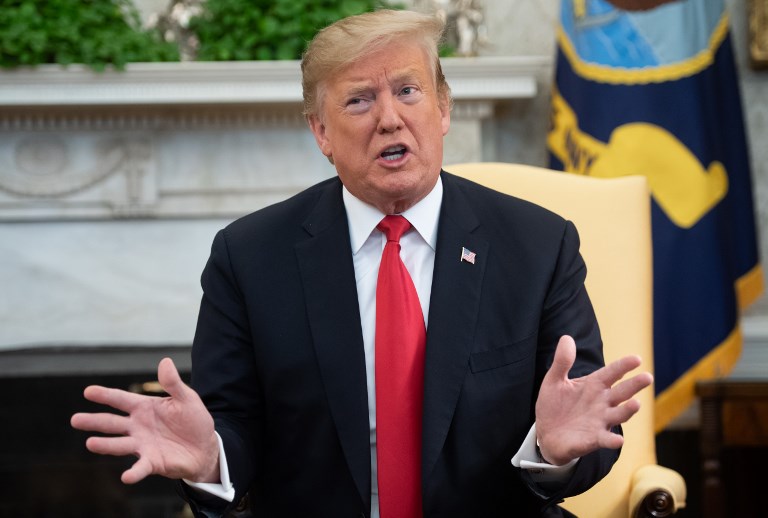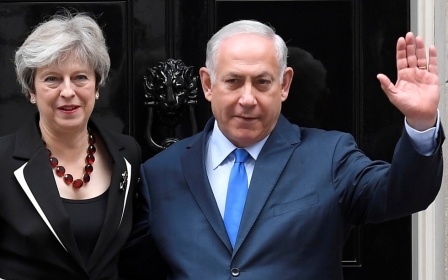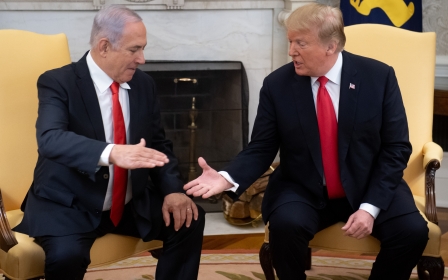Why is Britain providing cover for Israel's human rights abuses?

It was a bad day for Palestinians, but even worse for the long-term status of international law. I would go so far as to label 21 March "Black Thursday".
First, US President Donald Trump recognised Israel’s sovereignty over the Syrian Golan Heights, illegally occupied since its capture in 1967. Then, British Foreign Secretary Jeremy Hunt announced that Britain would oppose “every Item 7 resolution” at the UN Human Rights Council (HRC) on Israeli violations of Palestinian rights.
Rabidly pro-Israel
Trump’s Golan announcement came via Twitter: “After 52 years it is time for the United States to fully recognize Israel’s Sovereignty over the Golan Heights, which is of critical strategic and security importance to the State of Israel and Regional Stability!”
Emboldened by an anti-Palestinian and rabidly pro-Israel US administration, the extremist Israeli government is out to get what it can while that administration is in office.
New MEE newsletter: Jerusalem Dispatch
Sign up to get the latest insights and analysis on Israel-Palestine, alongside Turkey Unpacked and other MEE newsletters
All of these actions are in breach of international law, and counterproductive to any efforts to bring peace to the troubled holy land
Last year, Trump recognised Jerusalem as Israel’s capital and moved the US embassy to the holy city. Then, he cut US funding for the Palestinian refugee agency, UNRWA, and his team began to search for ways to end Palestinian refugees’ claims to the right to return to their homes. More recently, the occupied Palestinian territories lost their “occupied” designation.
All of these actions are in breach of international law, and counterproductive to any efforts to bring peace to the troubled holy land.
The UNHRC, established in 2006, is “an inter-governmental body within the United Nations system responsible for strengthening the promotion and protection of human rights around the globe and for addressing situations of human rights violations.”
Refusal to obey international law
In 2007, the council voted to make Israel’s actions a permanent agenda item. Under Item 7, human rights abuses by Israel and its continued illegal occupation of Arab lands would be reported on. It is interesting to note that out of the 47 members, only Canada voted against this decision.
As expected, Israel and its supporters in the US were outraged. They accused the council of bias and of singling Israel out. Yet, Israel’s human rights abuses - both before and since that decision - and its refusal to obey international humanitarian law confirm the need for that designation.
The UK continues to consider Israel an ally, despite its blatant disregard for international law, its human rights abuses and its refusal to implement 705 UN General Assembly resolutions. According to a 2002 study by Professor Steven Zunes of San Francisco University, Israel held the record for ignoring UN Security Council resolutions.
While the UK has condemned some of Israel’s policies, including settlements, home demolitions and evictions, it has taken no concrete actions to hold it to account. Where it matters, including when Israel is accused of committing war crimes or crimes against humanity, the UK has sided with Israel’s “right to self-defence”.
This has been particularly evident at the HRC. In 2009, Britain chose not to vote when the Goldstone report into Israel’s assault on Gaza earlier that year accused it of war crimes. This was despite the UN’s High Commissioner for Human Rights insisting that it was time to end the "culture of impunity" prevailing in Israel and the Palestinian territories.
True colours
Taking its lead from the US, which left the council last year, former UK foreign secretary Boris Johnson announced that the UK would “move next year to vote against all resolutions introduced under Item 7”.
On the eve of the UNHRC’s 40th meeting in Geneva this month, Hunt chose the Jewish Chronicle to confirm that Britain would “oppose every Item 7 resolution. On Friday we will vote against all four texts proposed in this way.”
Surely, Britain’s decision to provide cover for a foreign state’s human rights abuses should have been announced in the mass media, rather than a UK pro-Israel publication catering to some parts of the Jewish community. In so doing, he might also have contributed to the conflation of the UK’s Jewish community with Israel, which is dangerous.
The UK ultimately voted against all resolutions under Item 7, including the Palestinians’ right to self-determination. In a statement explaining its decision, the Foreign Office tried to justify this as an act not against the individual resolutions, but against the council’s decision to keep Item 7.
Bizarrely, it claimed some satisfaction that the accountability resolution, which had been moved to Item 2, resulted in a UK abstention.
The UK’s true colours in defending Israel came to the fore again when it abstained on the motion to adopt the report of the independent international commission of inquiry on the protests in the occupied Palestinian territories, which found “reasonable grounds” to believe that during Gaza’s Great March of Return, Israeli soldiers committed violations of international human rights and humanitarian law.
Who is getting special treatment?
The UK’s explanation was that it could not support a resolution that failed to investigate the role of non-state actors, particularly Hamas. The decision was roundly condemned by a coalition of charities, which called it a “dereliction of its responsibility”. Shadow Foreign Secretary Emily Thornberry pressed the government further, noting that its actions effectively told Israeli authorities: “We refuse to find fault with your actions.”
Both Britain and the US are not only shielding Israel from accountability for its crimes; they are damaging the standing of international law and international humanitarian law. They are also emboldening Israel to continue to feel that it can operate above the law.
Turning a blind eye to illegal facts on the ground sends a dangerous message to aggressors that no accountability will follow
If evidence was needed to confirm this, a tweet by Israeli MK Bezalel Smotrich should do. In the wake of Trump’s decision to recognise Israel’s sovereignty over the Golan, he called on the US president to also “recognise our sovereignty over the West Bank. God willing, we will work to achieve this soon. We hope to see your support, too.”
Trump and his administration have used a combination of “facts on the ground” and “biblical” arguments to justify their decisions in support of Israel, which breach international law. Turning a blind eye to illegal facts on the ground sends a dangerous message to aggressors that their aggression can be accepted with time, and that no accountability will follow.
As for biblical justifications, surely today’s “universal bible” is international law, painstakingly developed to replace the law of the jungle for the benefit of mankind.
If the status of international law is further eroded, simply for Israel’s sake, then who is being singled out for special treatment?
The views expressed in this article belong to the author and do not necessarily reflect the editorial policy of Middle East Eye.
Middle East Eye delivers independent and unrivalled coverage and analysis of the Middle East, North Africa and beyond. To learn more about republishing this content and the associated fees, please fill out this form. More about MEE can be found here.







